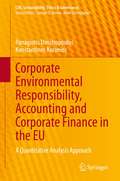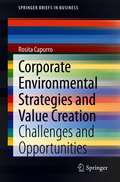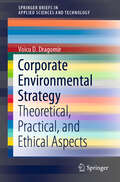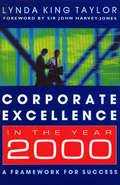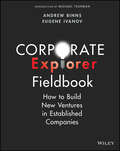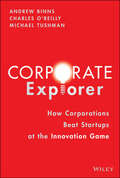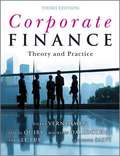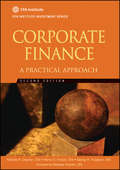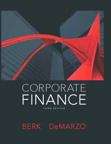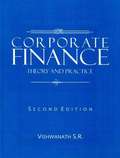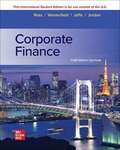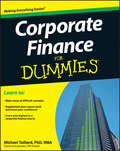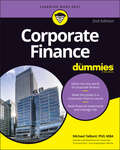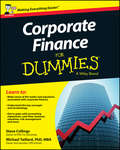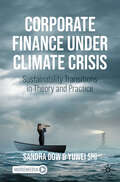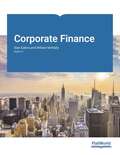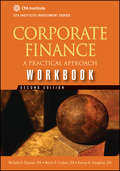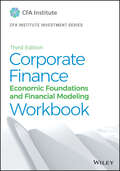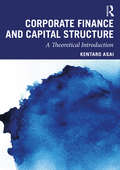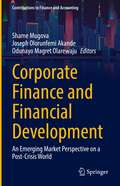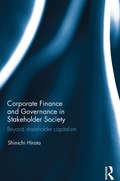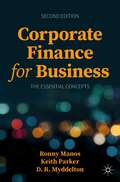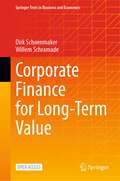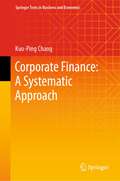- Table View
- List View
Corporate Environmental Responsibility, Accounting and Corporate Finance in the EU: A Quantitative Analysis Approach (CSR, Sustainability, Ethics & Governance)
by Panagiotis Dimitropoulos Konstantinos KoroniosThe purpose of this book is to study the association of corporate environmental responsibility (CER) with financial performance, capital structure, innovative activities, corporate risk, working capital management and accounting quality. Undoubtedly, CER has been developed into a crucial corporate issue around the world. CER has been incorporated within various sectors, countries and includes many types of activities and dimensions. A fundamental issue that is addressed in this book, is how corporate finance and accounting are affected by CER activities and how it impacts company performance. In order to analyse this interrelation, the authors focus on a sample of firms from 28 EU member countries. The purpose of this book is to study the association of CER with financial performance, capital structure, innovative activities, corporate risk, working capital management and accounting quality. The book also intends to provide useful policy recommendations as well as to offer constructive impulses for future research.
Corporate Environmental Strategies and Value Creation: Challenges and Opportunities (SpringerBriefs in Business)
by Rosita CapurroThe rise of sustainability has swept away the traditional views about firms’ competitiveness, survival and profitability, advocating new approaches. Although the strategic decisions on sustainable issues become more important, many firms have erroneously narrow view of environmental strategies and related practices generally have only an outward-looking focus. In line with these considerations, this book aims to investigate the “environmental dimension” as a new “strategic variable” for contributing to strengthen the competitive positioning of firms and to increase the value creation process. The author provides a comprehensive framework for green management by highlights practices and tools to translate strategy into effective environmental ideas. The focus is on goals and actions, from a side, and on the implementation of appropriate control systems useful for monitoring the results of environmental performance, on the other. As such, the book enriches sustainability literature, offers new insights for scholars, and provides implications for practitioners involved in green management.
Corporate Environmental Strategy: Theoretical, Practical, and Ethical Aspects (SpringerBriefs in Applied Sciences and Technology)
by Voicu D. DragomirThis book is a first step towards understanding the complexity of corporate environmental strategy while explaining the relationships between the numerous dimensions of the concept. When we think of corporate environmental strategy, we usually have in mind a dull and stereotypical statement issued by the CEO, addressing aspects such as pollution reduction, stakeholder dialogue, and unfailing care for the environment. However, genuine environmental protection relies on proactive policies, managerial commitment, cleaner technologies, and advanced management procedures. The author identifies a series of environmental strategy dimensions, some of which have been thoroughly researched in the literature, whereas others have only emerged in recent years. The main dimensions presented in this book include corporate environmental performance; environmental accounting and disclosure; environmental management practices; greening the supply-chain; environmental values and responsibility; green entrepreneurship and innovation; environmental training, culture and policies; and environmental legitimacy and reputation. For each dimension, the author develops a discussion framework, which provides the necessary operational definitions, methodological implications, and practical situations in which these constructs can be used. Each section contains a visual representation of the relationships between the dimensions of corporate environmental strategy and the actions of decision-makers and relevant stakeholders.
Corporate Excellence In The Year 2000: :A Framework for Success
by Lynda King TaylorLynda King Taylor interviews 30 of the UK's top businesspeople, including some of Britain's toughest bosses, and talks to them about how they survived the recession and plan for continued success. As well as the most traditional captains of industry she meets trendsetters - the 'gold-collar' workers constituting the new generation of bright, young and highly motivated managers, and top figures from sport (Graham Gooch, Will Carling), the arts (Kenneth Branagh), finance, leisure, media, charities etc - plus outstandingly successful figures from the public sector.
Corporate Explorer Fieldbook: How to Build New Ventures In Established Companies
by Andrew Binns Eugene IvanovBuild an innovative new startup using the resources of an existing corporation The Corporate Explorer Fieldbook: How to Build New Ventures in Established Companies is a one-of-a-kind collection of the tools, methodologies, and techniques you need to build successful, market-ready ventures from within existing organizations. The accomplished authors explain how to develop a practical strategy, gather market insights, develop a Jobs-To-Be-Done market canvas, collect customer research, reduce organizational risk, and more. You’ll learn how to beat the odds when introducing a new product or service into the marketplace and how to select, develop, and compensate the right people in your company to act as corporate explorers. Finally, the book explains how to secure authentic and enthusiastic buy-in for your new venture at the executive level. The Corporate Explorer Fieldbook will also teach you to: Conduct micro-experiments to distinguish legitimate business opportunities from ideas that lack traction Perform customer discovery interviews for ideating, incubating, and scaling ideas Generate breakthrough ideas from within large companies An indispensable companion to the newly published Corporate Explorer: How to Build New Ventures in Established Companies, the Corporate Explorer Fieldbook is a must-read, step-by-step guide for corporate entrepreneurs seeking to launch new ventures from within their existing organizations.
Corporate Explorer: How Corporations Beat Startups at the Innovation Game
by Charles A. O'Reilly Andrew Binns Michael TushmanCorporate Explorers Transform Disruption Into Opportunity With This Proven Framework Innovation used to be seen as a game best left to entrepreneurs, but now a new breed of corporate managers is flipping this logic on its head. These Corporate Explorers have the insight, resilience, and discipline to overcome the obstacles and build new ventures from inside even the largest organizations. Corporate Explorers are part entrepreneurs, using innovation disciplines to jump start cutting-edge ideas, and part change leaders, capable of creating support for investment. They see that corporations already own the ideas, resources, and—critically—the talent to build new ventures. Companies like Amazon, Microsoft, Bosch, LexisNexis, and Analog Devices enable managers to put these assets to use and gain an upper hand over startups that threaten to disrupt them. Corporate Explorer is a guidebook to the practices that enable these managers to go from idea into action. It demonstrates how success is not only possible but may offer entrenched companies better odds than venture-capital backed startups. This actionable and proven framework explains how managers can become successful corporate innovators; it includes tools to: Learn how to apply innovation practices with greater discipline Turn great ideas into a full-time job as an innovation leader Experiment with and scale original business models Transform innovation programs into a thriving source of new business Attract, retain, and motivate entrepreneurial talent Energize employees by creating a realistic way to innovate These lessons come from the trailblazers of corporate innovation—Andrew Binns (Change Logic), Charles O'Reilly (Stanford Graduate School of Business), and Michael Tushman (Harvard Business School)—who have decades of experience helping entrepreneurial-minded executives activate employees to become Corporate Explorers. Entrepreneurs take notice—it's time for Corporate Explorers to set the pace and chart the course for disruption.
Corporate Finance
by Maurizio Dallochio Pascal Quiry Yann Le Fur Pierre Vernimmen Antonio SalviCorporate Finance: Theory and Practice, 3rd Edition, the website www.vernimmen.com and the Vernimmen.com newsletter are all written and created by an author team who are both investment bankers/corporate financiers and academics.This book covers the theory and practice of Corporate Finance from a truly European perspective. It shows how to use financial theory to solve practical problems and is written for students of corporate finance and financial analysis and practising corporate financiers. Corporate Finance: Theory and Practice, 3rd Edition is split into four sections covering the basics of financial analysis; the basic theories behind valuing a firm; the major types of financial securities (equity, debt & options) and, finally, financial management; how to organise a company's equity capital, buying and selling companies, M&A, bankruptcy and cash flow management.Key features include:A section on financial analysis - a Corporate Financier must understand a company based on a detailed analysis of its accounts. Large numbers neglected this approach during the last stock market bubble and were caught in the crash that inevitably followed. How many investors took the trouble to read Enron's annual report? Those who did found that it spoke volumes!End of Chapter Summary, Questions and Answers, Glossary, European Case StudiesA supporting Website http://www.vernimmen.com with free access to statistics, a glossary & lexicon; articles, notes on financial transactions, basic financial figures for more than 10,000 European and US listed companies, thesis topics, a bibliography; case studies, Q&A; A letter box for your questions to the authors - a reply guaranteed within 72 hoursA free monthly newsletter on Corporate Finance sent out to subscribers to the site.
Corporate Finance
by Martin S. Fridson Michelle R. Clayman George H. Troughton Matthew ScanlanThe book that fills the practitioner need for a distillation of the most important tools and concepts of corporate financeIn today's competitive business environment, companies must find innovative ways to enable rapid and sustainable growth not just to survive, but to thrive. Corporate Finance: A Practical Approach is designed to help financial analysts, executives, and investors achieve this goal with a practice-oriented distillation of the most important tools and concepts of corporate finance.Updated for a post-financial crisis environment, the Second Edition provides coverage of the most important issues surrounding modern corporate finance for the new global economy:Preserves the hallmark conciseness of the first edition while offering expanded coverage of key topics including dividend policy, share repurchases, and capital structureCurrent, real-world examples are integrated throughout the book to provide the reader with a concrete understanding of critical business growth conceptsExplanations and examples are rigorous and global, but make minimal use of mathematicsEach chapter presents learning objectives which highlight key material, helping the reader glean the most effective business advice possibleWritten by the experts at CFA Institute, the world's largest association of professional investment managersCreated for current and aspiring financial professionals and investors alike, Corporate Finance focuses on the knowledge, skills, and abilities necessary to succeed in today's global corporate world.
Corporate Finance
by Stephen A. Ross Randolph Westerfield Jeffrey F. Jaffe'Corporate Finance' emphasizes the modern fundamentals of the theory of finance while providing contemporary examples to make the theory come to life. The authors present corporate finance as the working of a small number of integrated and powerful institutions, rather than a collection of unrelated topics. They develop the central concepts of modern finance: arbitrage, net present value, efficient markets, agency theory, options, and the trade-off between risk and return, and use them to explain corporate finance with a balance of theory and application. This text distills the subject of corporate finance down to its core, while leaving more specialized topics to follow-up courses.
Corporate Finance
by Jonathan Berk Peter DeMarzoALERT: Before you purchase, check with your instructor or review your course syllabus to ensure that you select the correct ISBN. Several versions of Pearson's MyLab & Mastering products exist for each title, including customized versions for individual schools, and registrations are not transferable. In addition, you may need a CourseID, provided by your instructor, to register for and use Pearson's MyLab & Mastering products.
Corporate Finance
by S R VishwanathThis--revised and enhanced--book examines the role of finance in supporting other functional areas while fostering an understanding of how financial decisions can create value. Corporate Finance covers areas related to estimating divisional cost of capital; executing a financing strategy; establishing debt and dividend policies consistent with the company`s strategy and environment; choosing between dividends and stock repurchases; managing high growth and managing working capital. Its new topics include: - Corporate Financial Flexibility (Real options) - New Financial Instruments - Project Finance - Acquisitions and Control - Performance Measurement and Incentive Compensation The goal of this book is to provide a thorough understanding of how and why firms make their financial decisions the way they do and their impact on shareholder value. The central theme of the book is Value Based Management, which assumes that maximizing shareholder value is the governing objective of a firm. Each chapter of this new edition has detailed and real-life cases to help students easily understand and grasp concepts. The author has also provided the case-map of the Harvard Business School to make this book more user-friendly in classrooms. The inclusion of several new topics/cases, extensive pedagogical tools and a finance-for-non-finance approach make this book ideal for MBA/CA/CFA/ICWA students and executive education programs.
Corporate Finance 13e: Patients And Serv:ice Users
by RossInternational Student Edition of Corporate Finance 13th Edition by Stephen A. Ross Franco Modigliani Professor of Financial Economics Professor (Author), Randolph W Westerfield Robert R. Dockson Deans Chair in Bus. Admin. (Author), Jeffrey Jaffe (Author), Bradford D Jordan Professor (Author) This ISBN is textbook only. The content of all formats are the same. Corporate Finance, by Ross, Westerfield, Jaffe, and Jordan, was written for the corporate finance course at the MBA level and the intermediate course in many undergraduate programs. The text emphasizes the modern fundamentals of the theory of finance while providing contemporary examples to make the theory come to life. The authors aim to present corporate finance as the working of a small number of integrated and powerful intuitions rather than a collection of unrelated topics. They develop the central concepts of modern finance: arbitrage, net present value, efficient markets, agency theory, options, and the trade-off between risk and return, and use them to explain corporate finance with a balance of theory and application. The 13th edition also welcomes a special contributor, Professor Kelly Shue of Yale University.
Corporate Finance For Dummies
by Michael TaillardScore your highest in corporate financeThe math, formulas, and problems associated with corporate finance can be daunting to the uninitiated. Corporate Finance For Dummies introduces you to the practices of determining an operating budget, calculating future cash flow, and scenario analysis in a friendly, un-intimidating way that makes comprehension easy.Corporate Finance For Dummies covers everything you'll encounter in a course on corporate finance, including accounting statements, cash flow, raising and managing capital, choosing investments; managing risk; determining dividends; mergers and acquisitions; and valuation.Serves as an excellent resource to supplement coursework related to corporate financeGives you the tools and advice you need to understand corporate finance principles and strategiesProvides information on the risks and rewards associated with corporate finance and lendingWith easy-to-understand explanations and examples, Corporate Finance For Dummies is a helpful study guide to accompany your coursework, explaining the tough stuff in a way you can understand.
Corporate Finance For Dummies
by Michael TaillardGet a handle on one of the most powerful forces in the world today with this straightforward, no-jargon guide to corporate finance A firm grasp of the fundamentals of corporate finance can help explain and predict the behavior of businesses and businesspeople. And, with the right help from us, it’s not that hard to learn! In Corporate Finance For Dummies, an expert finance professor with experience in everything from small business to large, public corporations walks you through the basics of the subject. You’ll find out how to read corporate financial statements, manage risks and investments, understand mergers and acquisitions, and value corporate assets. In this book, you will also: Get a plain-English introduction to the financial concepts, instruments, definitions, and strategies that govern corporate finance Learn how to value a wide variety of instruments, from physical assets to intangible property, bonds, equities, and derivatives Explore the intricacies of financial statements, including the balance sheet, income statement, and statement of cash flowsPerfect for students in introductory corporate finance classes looking for an easy-to-follow supplementary resource, Corporate Finance For Dummies, delivers intuitive instruction combined with real-world examples that will give you the head start you need to get a grip on everything from the cost of capital to debt analytics, corporate bonds, derivatives, and more.
Corporate Finance For Dummies - UK
by Michael Taillard Steven CollingsThe maths, the formulas, and the problems associated with corporate finance can be daunting to the uninitiated, but help is at hand. Corporate Finance For Dummies, UK Edition covers all the basics of corporate finance, including: accounting statements; cash flow; raising and managing capital; choosing investments; managing risk; determining dividends; mergers and acquisitions; and valuation. It also serves as an excellent resource to supplement corporate finance coursework and as a primer for exams. Inside you'll discover: The tools and expert advice you need to understand corporate finance principles and strategies Introductions to the practices of determining an operating budget, calculating future cash flow, and scenario analysis - in plain English Information on the risks and rewards associated with corporate finance and lending Easy-to-understand explanations and examples Help to pass your corporate finance exam!
Corporate Finance Under Climate Crisis: Sustainability Transitions in Theory and Practice
by Sandra Dow Yuwei ShiThis textbook addresses the complexities associated with the practice of corporate finance in the transition to a Net-Zero world. Understanding the impact of climate change on corporate finance requires synthesis of climate science, climate policy, and traditional finance tools. The book provides readers with the knowledge, skills, and innovative thinking required to navigate the complex landscape of climate change within the corporate setting. This textbook holds a unique and influential position in the marketplace due to its focus on the critical intersection of corporate finance and climate change. Unlike traditional corporate finance textbooks, this resource specifically addresses the challenges, opportunities, and strategies associated with investment and financing decisions and risk management in the face of the global climate crisis. By exploring topics such as integrating climate risks in financial decision-making, valuing climate-related investments, and the role of financial institutions in climate finance, this textbook equips students, finance professionals, and corporate leaders with the knowledge and tools needed to drive positive change and build a sustainable future for businesses worldwide.
Corporate Finance Version 2.1
by Stan EakinsWhen purchased from FlatWorld (the publisher), this Color Print Textbook includes Online Access, Quizzes, Flashcards and Homework (if professor uses Homework system). Online textbook is accessible. Corporate Finance is the first principles of finance textbook that was written specifically for delivery on an online platform. In this first edition published with FlatWorld, this book’s pioneering digital-first strategy has found a perfect home. The book encourages students to push beyond rote memorization of “how to do the math” to truly understand the meaning of the numbers.
Corporate Finance Workbook
by Martin S. Fridson Michelle R. Clayman George H. TroughtonThe workbook to accompany Corporate Finance: A Practical Approach, Second Edition
Corporate Finance Workbook: Economic Foundations and Financial Modeling (CFA Institute Investment Series)
by CFA InstituteEvaluate your understanding of corporate finance with practice for today&’s professional Corporate Finance: Economic Foundations and Financial Modeling Workbook, 3rd Edition offers the key component of effective learning—practice. Designed for both students and investment professionals, this companion workbook aligns with the latest Corporate Finance text chapter-by-chapter. To improve your comprehension of core concepts, this book includes brief chapter summaries before diving into challenging practice questions and their solutions, while also laying out learning objectives so you can understand the &“why&” of each exercise. Corporate Finance: Economic Foundations and Financial Modeling Workbook, 3rd Edition will help you: Synthesize essential material from the main Corporate Finance text using real-world applications. Understand the key fundamentals of the corporate finance discipline. Work toward specific chapter objectives to internalize important information. CFA Institute is the world&’s premier association for investment professionals, and the governing body for the CFA® Program, CIPM® Program, CFA Institute ESG Investing Certificate, and Investment Foundations® Program. Those seeking a deeper understanding of corporate finance and its overall impact on organizational growth will value the level of expertise CFA Institute brings to the discussion as well as the extra practice delivered in the third edition Corporate Finance: Economic Foundations and Financial Modeling Workbook based on real scenarios investors face every day.
Corporate Finance and Capital Structure: A Theoretical Introduction
by Kentaro AsaiCapital structure choice is essential for an institution to maximize its value. Because the institution’s decision maker decides how to finance projects before making investment decisions, its financial decisions ultimately affect every aspect of operations thereafter. This book discusses several key theories of corporate capital structure to answer how funding structure shapes an institution’s value. In this book, the author emphasizes the microeconomic foundations of capital structure theory. He shows how various microeconomic frameworks, such as price and game theories, principal–agent model, and mechanism design, can be applied to solve the optimal capital structure of a firm. By getting used to optimizing corporate capital structures subject to various constraints via microeconomic frameworks, readers will become capable of investigating how to finance projects in their own setups. Thus, this book not only informs readers of specific knowledge but also provides them with tools to solve new problems that they will face in their future. This book will be a valuable resource for students of corporate finance at the postgraduate or doctoral level and will serve as the material for professional training aimed at practitioners and regulators with technical expertise.
Corporate Finance and Financial Development: An Emerging Market Perspective on a Post-Crisis World (Contributions to Finance and Accounting)
by Shame Mugova Joseph Olorunfemi Akande Odunayo Magret OlarewajuThis book addresses key issues in corporate finance and explores them from financial development and financial stability perspectives in emerging markets. Emerging economies are susceptible to rapidly changing financial sectors and products as well as financial upheavals. In this light, the growing interdependence of states and capital markets, and the risk of crises have an impact on the financing of firms. The chapters in this book highlight how companies and policies in emerging markets are affected and deal with the current post-crisis world. By combining academic and industry insights, the critical issues in corporate finance, financial development, and the preparedness of emerging markets are explored.
Corporate Finance and Governance in Stakeholder Society: Beyond shareholder capitalism
by Shinichi HirotaThis book develops a new framework - the stakeholder model - that helps to understand corporate finance and governance in modern society, where the sources of people’s happiness have shifted from monetary to non-monetary factors. The book takes a more comprehensive approach than is typically found in the standard economics and finance literature, by explicitly incorporating both the monetary and non-monetary interests of stakeholders and by examining the value creation of corporations from a much broader perspective. Specifically, the book addresses contemporary issues concerning corporate finance and governance worldwide, including: How should we define corporate value in stakeholder society? What is the role of modern corporations? What are the principles underlying corporate financing decisions? To what extent should shareholder rights be enhanced? What determines the effectiveness of a company’s board of directors? What missions do firms set out and what is the role of mission statements? How can we understand the diversity of financial and governance systems among different countries? What legal and institutional reforms enhance or diminish corporate value in stakeholder society? The book will answer these questions theoretically and empirically.
Corporate Finance for Business: The Essential Concepts
by Ronny Manos Keith Parker D. R. MyddeltonTaking a concise approach to the key concepts of finance, this textbook clearly focuses on the most relevant issues around financial management, which will be of interest to business managers, students and anyone who wishes to understand the basics of finance. Covering cash and working capital, capital project appraisal, risk and uncertainty, financial markets, the cost of capital, mergers and acquisitions and valuation, financial concepts are applied to the business world using real life examples. This text is both international and contemporary in outlook, reflecting the financial environment in which all businesses operate.
Corporate Finance for Long-Term Value (Springer Texts in Business and Economics)
by Dirk Schoenmaker Willem SchramadeThis open access textbook offers a guide to corporate finance for modern companies that want to create long-term value. Drawing on recent literature on sustainable companies, it starts by analysing the Sustainable Development Goals as a strategy for the transition to a sustainable economy. Next, it translates the general concept of sustainability into core corporate finance methods, such as net present value, company valuation, cost of capital, capital structure and M&A.Current corporate finance textbooks are primarily based on the shareholder model, designed to maximise financial value. This book instead adopts the integrated model, which argues that companies have to serve the interests of their current and future stakeholders. Accordingly, companies move from simply maximising financial value to optimising integrated value, which combines financial, social and environmental value. Applying this new paradigm of integrated value is the truly innovative feature of this textbook.Written for undergraduate and graduate students of Finance, Economics, and Business Administration, this textbook provides a fresh analysis of corporate finance. Combining theory, empirical data and examples from actual companies, it reveals the sustainability challenges for corporate investment and shows how finance can be used to steer funds to sustainable companies and projects and thus accelerate the transition to a sustainable economy.
Corporate Finance: A Systematic Approach (Springer Texts in Business and Economics)
by Kuo-Ping ChangThis textbook takes on a systematic approach to elaborating on the different subjects within corporate finance. The chapters bring together existing concepts with examples and stories that allow students to easily understand and apply financial tools. In doing so, the book strives to clarify misconceptions in the literature on topics related to firm’s ownership and control, problems of the Modigliani-Miller first and second propositions, relationship between options and corporate finance, behavioral finance versus corporate finance, etc. The book takes into consideration the growing importance of the Asian economy and financial markets in recent years, and constructs the P-index to measure and compare the risk structures of US and China’s stocks and stock indexes. This book is a primary text written for the introductory courses in corporate finance at the M.B.A. level and for the intermediate courses in undergraduate programs, but can also be of great use to Ph.D. students as well as professionals.
